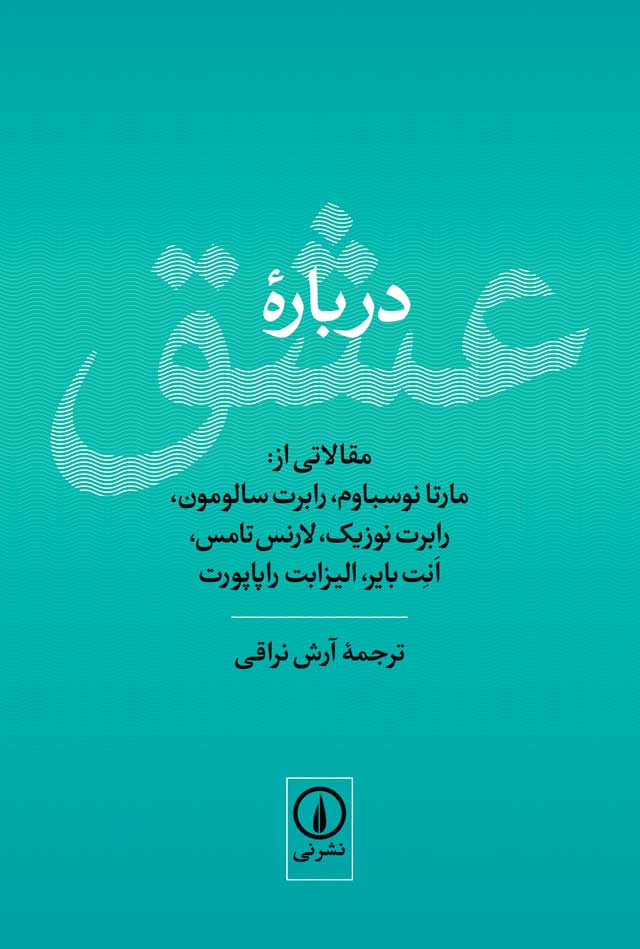
Robert C. Solomon (September 14, 1942 – January 2, 2007) was a professor of continental philosophy at the University of Texas at Austin. Early life Solomon was born in Detroit, Michigan. His father was a lawyer, and his mother an artist. After earning a B.A. (1963) at the University of Pennsylvania, he moved to the University of Michigan to study medicine, switching to philosophy for an M.A. (1965) and Ph.D. (1967). He held several teaching positions at such schools as Princeton University, the University of California, Los Angeles, and the University of Pittsburgh. From 1972 until his death, except for two years at the University of California at Riverside in the mid-1980s, he taught at University of Texas at Austin, serving as Quincy Lee Centennial Professor of Philosophy and Business. He was a member of the University of Texas Academy of Distinguished Teachers. Solomon was also a member of the inaugural class of Academic Advisors at the Business Roundtable Institute for Corporate Ethics. His interests were in 19th-century German philosophy—especially Hegel and Nietzsche—and 20th-century Continental philosophy—especially Sartre and phenomenology, as well as ethics and the philosophy of emotions. Solomon published more than 40 books on philosophy, and was also a published songwriter. He made a cameo appearance in Richard Linklater's film Waking Life (2001), where he discussed the continuing relevance of existentialism in a postmodern world. He developed a cognitivist theory of the emotions, according to which emotions, like beliefs, were susceptible to rational appraisal and revision. Solomon was particularly interested in the idea of "love," arguing against the notion that romantic love is an inherent state of being, and maintaining, instead, that it is instead a construct of Western culture, popularized and propagated in such a way that it has achieved the status of a universal in the eyes of many. Love for Solomon is not a universal, static quality, but an emotion, subject to the same vicissitudes as other emotions like anger or sadness. Solomon received numerous teaching awards at the University of Texas at Austin, and was a frequent lecturer in the highly regarded Plan II Honors Program. Solomon was known for his lectures on Nietzsche and other Existentialist philosophers. Solomon described in one lecture a very personal experience he had while a medical student at the University of Michigan. He recounted how he stumbled as if by chance into a crowded lecture hall. He was rather unhappy in his medical studies at the time, and was perhaps seeking something different that day. He got precisely that. The professor, Frithjof Bergmann, was lecturing that day on something that Solomon had not yet been acquainted with. The professor spoke of how Nietzsche's idea asks the fundamental question: "If given the opportunity to live your life over and over again ad infinitum, forced to go through all of the pain and the grief of existence, would you be overcome with despair? Or would you fall to your knees in gratitude?" Solomon died on January 2, 2007 at Zurich airport. His wife, philosopher Kathleen Higgins, with whom he co-authored several of his books, is Professor of Philosophy at University of Texas at Austin.
Series
Books

From Rationalism to Existentialism
The Existentialists and Their Nineteenth-century Backgrounds
1972

The Passions
Philosophy and the Intelligence of Emotions
2006

The Little Philosophy Book
2007

The Passions
Emotions and the Meaning of Life
1976

Continental Philosophy Since 1750
The Rise and Fall of the Self
1988

What is Justice?
Classic and Contemporary Readings
1990

A Short History of Philosophy
1996

Reading Nietzsche
1989

Introducing the Existentialists
Imaginary Interviews with Sartre, Heidegger and Camus
1981

Existentialism
1974

Love and Sexuality
2003

A Better Way to Think About Business
How Personal Integrity Leads to Corporate Success
1999

Dark Feelings, Grim Thoughts
Experience and Reflection in Camus and Sartre
2006

True to Our Feelings
What Our Emotions Are Really Telling Us
2001

Not Passion's Slave
Emotions and Choice
2003

Morality and the Good Life
An Introduction to Ethics Through Classical Sources
1998

The Joy of Philosophy
Thinking Thin versus the Passionate Life
1999

Introducing Philosophy
A Text with Integrated Readings
1989

Building Trust
In Business, Politics, Relationships, and Life
2001

Love
Emotion, Myth, and Metaphor
1990

دربارۀ عشق
2011

From Hegel to Existentialism
1987

Ethics and Excellence
Cooperation and Integrity in Business
1992

A Passion for Wisdom
A Very Brief History of Philosophy
1997

What Nietzsche Really Said
2000
The Great Courses, No Excuses
Existentialism and the Meaning of Life
2000

Spirituality for the Skeptic
The Thoughtful Love of Life
2002

Living with Nietzsche
What the Great "Immoralist" Has to Teach Us
2003

From Africa to Zen
An Invitation to World Philosophy
1993

About Love
Reinventing Romance for Our Times
1988

Thinking about Feeling
Contemporary Philosophers on Emotions
2004

The Big Questions
A Short Introduction to Philosophy
1982

Introducing the German Idealists
Mock Interviews with Kant, Hegel, and Others
1981

What Is an Emotion?
Classic and Contemporary Readings
2003

No Excuses
Existentialism and the Meaning of Life
1995

In Defense of Sentimentality
2004

In the Spirit of Hegel
1983

The Age of German Idealism
Routledge History of Philosophy, Volume 6
1993

Phenomenology and Existentialism
1972





